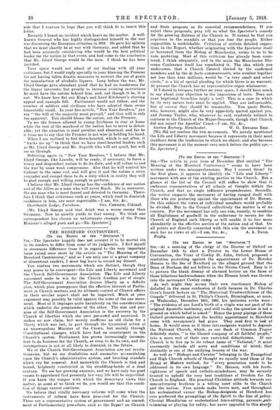THE HEREFORD CONTROVERSY.
(To THE EDITOR or THE " SPECTATOR."] Sia,—The Spectator happily does not account it to be mortal sin in its readers to differ from some of its judgments. I find myself in strenuous difference from it in regard to the very important issue raised once more by the article on " The Meaning of the Hereford Controversy," and as I am only one of a great company of dissentient readers, I must beg leave to record my dissent.
You confuse two movements which are distinct, though they may prove to be convergent—the Life and Liberty movement and the Church Self-Government AssociaEon. The Life and Liberty movement seeks to win for the Church freedom pair et simple. The Self-Government Association desires liberty on a definite plan, which plan presupposes that the effective interest of Parlia- ment in Church matters and its ultimate control of Church affairs in their secular aspect shall not be impaired. Much of your argument may possibly be valid against the aims of the one move- ment. Most of it impinges quite harmlessly on the considerations which underlie the programme of the other. The aim and pur- pose of the Self-Government Association is the recovery by the Church of liberties which she once possessed and exercised. It makes no new claim, but merely reaffirms an old claim for a liberty which was lost, in part through the tyrannical action of an unscrupulous Minister of the Crown, but mainly through Constitutional changes, which have bad no counterpart in the Church's system. Parliament has grown increasingly incompe- tent to do business for the Church, or even to do its own, and the incompetence is not at all likely to diminish in the future.
We of the Church Self-Government Association are not revolu- tionaries, but we see disabilities and anomalies accumulating upon the Church's administrative system, and breeding scandals which cry for removal. And meanwhile the Church is tied and bound, helplessly constricted in the swaddling-bands of a dead century. We see her growing anaemic, and we have only too good reason to apprehend that presently her very life will be imperilled. If you knew the temper with which the democracy views this matter, as some of us think we do, you would see that this condi- tion of things cannot continue.
We believe that vitally necessary reforms will come when the instruments of reform have been procured for the Church. These are a representative system of government and an amend- ment of Parliamentary procedure, such as the Report on Church and State proposes as its essential recommendations. If you reject these proposals, pray tell us what the Spectator's remedy for the growing distress of the Church is. It cannot be that you acquiesce in the scandals or that you fear the people. Either supposition is unthinkable. Criticism of certain detailed sugges- tions in the Report, whether originating with the Spectator itself or borrowed from the Bishop of Manchester, seems to us to be vain posturing. Most of this criticism has already been coun- tered, I think adequately, and in the main the Manchester Dio- cesan Conference itself has repudiated it. The idea which you underscore, that a Church Council elected by the confirmed members and by the de facto communicants, who number together not less than nine millions, would be " a very small and select circle," is a bit of special pleading for which there is no warrant. At present the Church has no representative organ whatsoever.
If I dared to trespass further on your space, I should have much to say about your objection to the imposition of tests. Does not your baptismal franchise imply a test? This is a case in which by its very nature tests must be applied. They are indispensable, but of course they should be reasonable. You quote Burke, who, however, might also be very appositely quoted against you, and Jeremy Taylor, who, whatever he said, resolutely refused to conform to the Church of the Major-Generals, though that Church did not reject the Apostles' Creed.—I am, Sir, &c., Gorton Rectory, Manchester. W. G. EDWARDS REES. [We did not confuse the two movements. We merely mentioned the Life and Liberty movement because it represents in their most insidious form the tendencies to which we object, and also because this movement is at the moment very much before the public eye.— En. Spectator.]


































 Previous page
Previous page